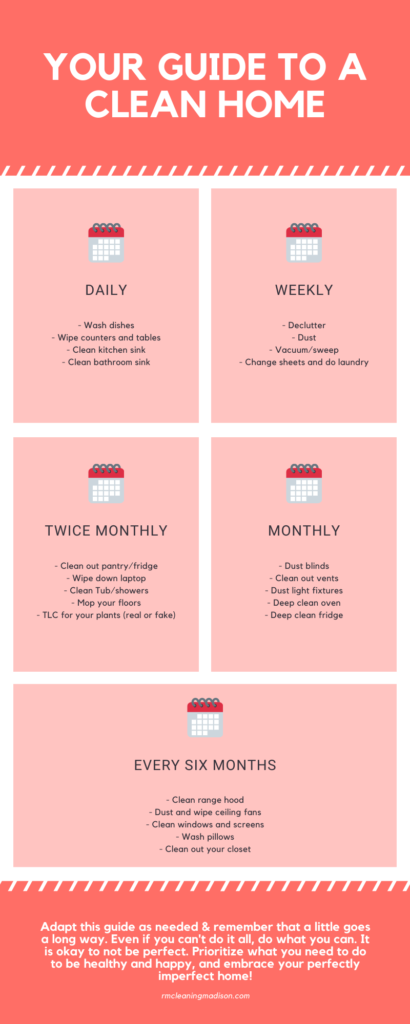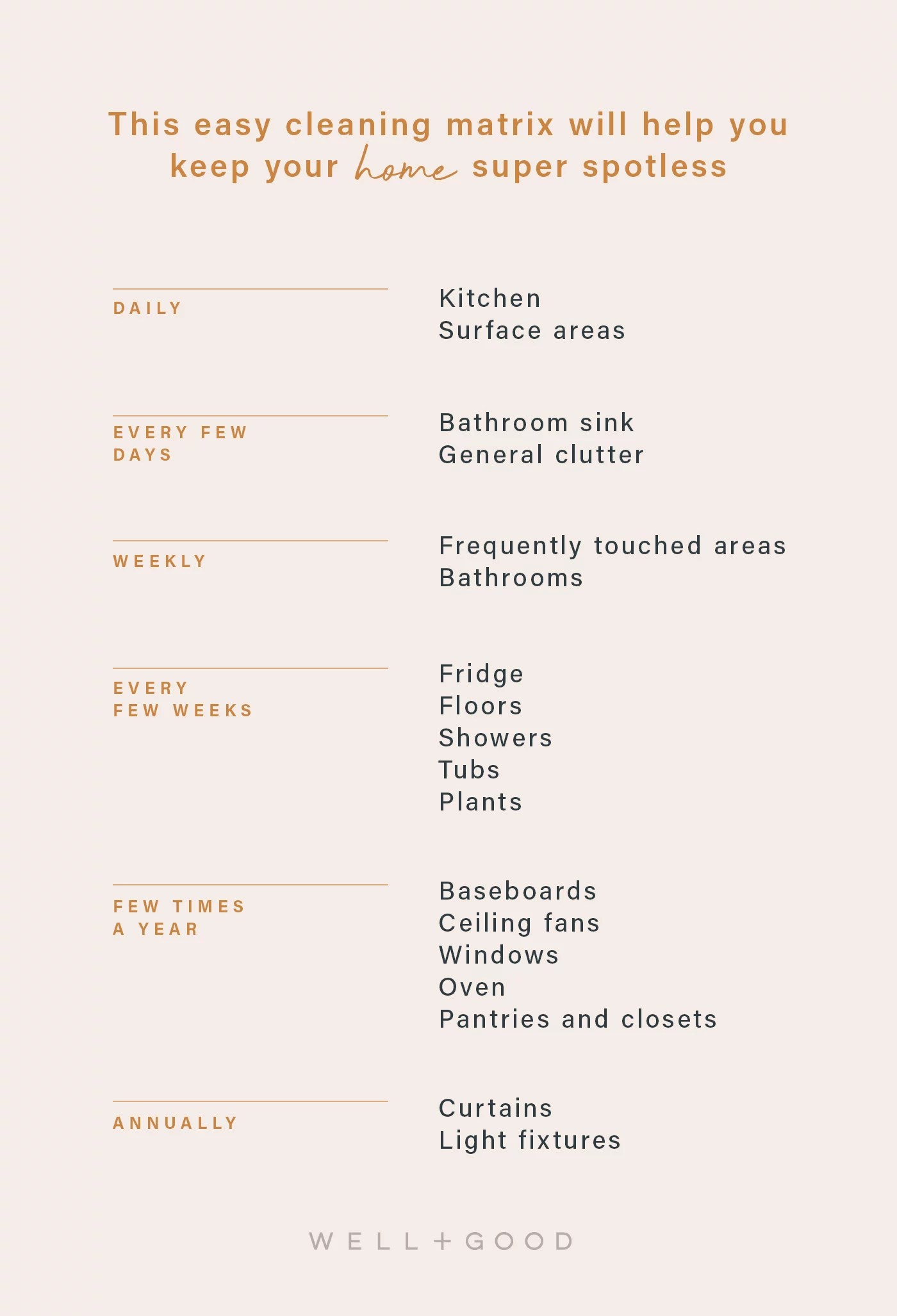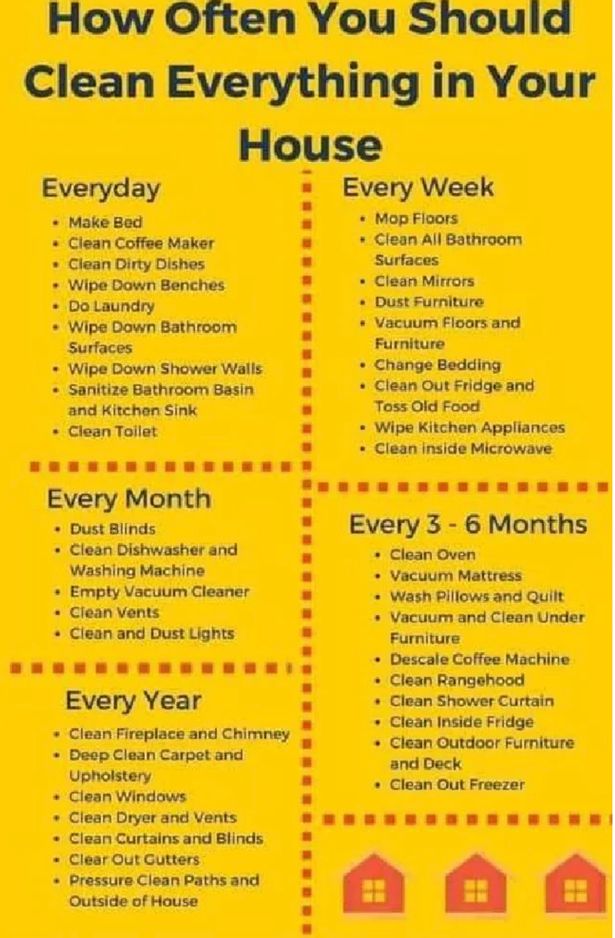Well, folks, prepare to have your mind blown because we’re about to tackle the age-old question of how often a house should be cleaned. Buckle up, because we’re about to embark on a journey of cleanliness and domestic bliss that will make Martha Stewart proud.
Now, let’s not beat around the bush. The honest answer to this question is, as often as you damn well please. Hear us out. If your idea of a clean house involves a quick sweep and a once-over with a damp cloth, then by all means, go for it. However, if you’re a bit more particular and feel the need to scrub every nook and cranny until it shines, then go ahead and do that too. The point is, there’s no right or wrong answer here. It’s your house, and you get to decide how clean it needs to be. So go ahead, grab that feather duster and dance like nobody’s watching. We won’t judge.

This image is property of images.squarespace-cdn.com.
Factors that determine how often a house should be cleaned
Cleaning the house is a chore that most people dread. However, maintaining a clean and organized living space is essential for our physical and mental well-being. But how often should a house be cleaned? The answer to this question depends on several factors that we will explore in this article.
Size of the house
The size of the house plays a significant role in determining how often it should be cleaned. A larger house will generally require more frequent cleaning, as there are more rooms and surfaces to maintain. On the other hand, a smaller house may not require as much cleaning, but it still needs regular attention to prevent dust and dirt from accumulating.
Number of occupants
The number of people living in a house also affects the frequency of cleaning. A house with many occupants, such as a large family or shared living arrangement, will naturally accumulate more dirt, dust, and mess. In such cases, more frequent cleaning is necessary to keep the house hygienic and tidy.
Presence of pets
Pets are like family members, but they can also contribute to the mess in the house. Fur, dander, and tracked-in dirt are common issues faced by pet owners. If you have pets, especially ones with long hair or those that shed excessively, you may need to clean your house more frequently to prevent the buildup of allergens and odors.
Type of flooring and furnishings
The type of flooring and furnishings in your house can also affect how often you need to clean. Carpets, for example, tend to trap dirt, dust, and allergens, requiring regular vacuuming and occasional deep cleaning. Hardwood or tile floors, on the other hand, are more forgiving and may not need as much attention. The same applies to upholstered furniture, which can hold onto dust and stains more easily than leather or vinyl.
Frequency of basic cleaning tasks
In addition to considering the factors mentioned above, it’s important to establish a regular cleaning routine for the various tasks involved in maintaining a clean house. Let’s take a look at some of the most common cleaning tasks and how often they should be done.
Dusting and vacuuming
Dusting and vacuuming are fundamental cleaning tasks that should be done on a regular basis. The frequency of these tasks depends on factors such as the number of people and pets in the house, the level of foot traffic, and whether anyone has allergies or respiratory conditions. In general, it is recommended to dust surfaces and vacuum floors at least once a week.
Mopping and sweeping
Mopping and sweeping are essential for keeping floors clean and free from dirt and grime. The frequency of these tasks varies depending on the type of flooring and how often the area is used. High-traffic areas, such as the kitchen and entryway, may need to be swept or mopped more frequently than rooms that are less frequently used.
Bathroom cleaning
Bathrooms are notorious for being breeding grounds for germs and bacteria. Regular cleaning is crucial to maintain a hygienic environment and prevent the buildup of mold and mildew. It is recommended to clean the bathroom at least once a week, focusing on surfaces such as the toilet, sink, bathtub, and shower.
Kitchen cleaning
The kitchen is another area that requires regular attention to prevent the growth of bacteria and keep it safe for food preparation. Countertops, sinks, and appliances should be wiped down daily, while larger tasks such as oven cleaning or defrosting the freezer can be done on a monthly or seasonal basis.
Specialized cleaning tasks
Beyond the basic cleaning tasks, there are specific areas in the house that may require specialized cleaning. These tasks can be done less frequently, depending on the condition of the area and the individual needs of the household.
Carpet cleaning
Carpet cleaning is an important task that should not be overlooked. Over time, carpets can accumulate dirt, stains, and odors. Regular vacuuming is necessary to remove surface dirt, but carpets also benefit from periodic deep cleaning. The frequency of carpet cleaning depends on factors such as the amount of foot traffic and whether anyone in the house has allergies or respiratory conditions.
Upholstery cleaning
Just like carpets, upholstered furniture can harbor dirt, dust, and allergens. Regular vacuuming and spot cleaning can help to keep upholstery clean, but professional cleaning is recommended at least once a year to remove deep-seated dirt and stains.
Window cleaning
Clean windows can make a significant difference in the overall appearance of your home. However, they often get neglected in the cleaning routine. Window cleaning can be done on a bi-weekly or monthly basis, depending on personal preference and the level of dust and dirt in your area.
Air duct cleaning
Air ducts are responsible for circulating air throughout the house, but they can also accumulate dust and allergens over time. While air duct cleaning is not necessary on a regular basis, it is recommended every 3-5 years to maintain a healthy indoor air quality.
Cleaning schedule for different parts of the house
To establish a cleaning routine, it is helpful to break down the house into different areas and assign specific cleaning tasks to each area. Here is a suggested cleaning schedule based on different parts of the house:
Living room and bedrooms
The living room and bedrooms are typically low-maintenance areas that require regular dusting, vacuuming, and occasional upholstery cleaning. These areas can be cleaned once a week or bi-weekly, depending on personal preferences and the level of use.
Kitchen and dining area
The kitchen and dining area are high-traffic zones that need regular attention. Countertops, sinks, and appliances should be wiped down daily, while larger tasks such as oven cleaning or defrosting the freezer can be done on a monthly or seasonal basis.
Bathrooms
Bathrooms are high-moisture areas that require regular cleaning to prevent the growth of mold and mildew. It is recommended to clean the bathroom at least once a week, focusing on surfaces such as the toilet, sink, bathtub, and shower.
Hallways and stairs
Hallways and stairs are often overlooked when it comes to cleaning, but they accumulate a significant amount of dust and dirt. Vacuuming or sweeping these areas once a week should be sufficient to keep them clean.
Outdoor areas
Outdoor areas such as patios, decks, and porches require cleaning on a seasonal basis. This can include tasks such as power washing, removing debris, and cleaning outdoor furniture.

This image is property of townsquare.media.
House cleaning frequency based on cleanliness preferences
The frequency of house cleaning can also be influenced by personal preferences and the desired level of cleanliness. Some people prefer a spotless, organized house at all times, while others are more relaxed about cleanliness. Here are some suggested cleaning frequencies based on different cleanliness preferences:
Daily cleaning
Daily cleaning involves quick tasks to maintain a clean and tidy living space. This may include tasks such as making the bed, tidying up clutter, wiping down kitchen counters, and doing a quick sweep or vacuum of high-traffic areas. Daily cleaning helps to prevent the accumulation of dirt and keeps the house looking presentable.
Weekly cleaning
Weekly cleaning involves more in-depth tasks and should cover all areas of the house. This includes tasks such as dusting surfaces, vacuuming or mopping floors, cleaning bathrooms, and wiping down kitchen appliances. Weekly cleaning helps to maintain a clean and hygienic living environment.
Bi-weekly cleaning
Bi-weekly cleaning involves performing more detailed cleaning tasks on a less frequent basis. This may include tasks such as deep cleaning carpets or upholstery, washing windows, and performing more thorough dusting and vacuuming throughout the house.
Monthly cleaning
Monthly cleaning tasks go beyond the regular maintenance and involve more time-consuming tasks. These tasks may include things like deep cleaning the oven, wiping down walls and baseboards, and organizing closets and storage spaces. Monthly cleaning helps to prevent the buildup of dirt and grime in less frequently used areas of the house.
Seasonal deep cleaning
Seasonal deep cleaning involves tackling larger cleaning projects that may not often be done. This can include tasks such as cleaning out the garage, deep cleaning the refrigerator, or washing curtains and blinds. Seasonal deep cleaning helps to refresh the house and maintain a clean and organized living space.
Impact of lifestyle and habits on cleaning frequency
Beyond the factors mentioned above, lifestyle and habits also play a role in determining how often a house should be cleaned. Here are some common scenarios that may affect cleaning frequency:
Busy and hectic schedules
If you have a busy and hectic schedule, you may find it challenging to find time for regular cleaning. In this case, it may be helpful to hire a professional cleaning service or establish a cleaning routine that prioritizes the most important tasks.
Presence of allergies or respiratory conditions
If anyone in your household has allergies or respiratory conditions, it is essential to maintain a clean and dust-free environment. Cleaning tasks such as dusting, vacuuming, and changing bedding should be done more frequently to minimize allergens.
Pet owners and cleaning needs
Pet owners need to be especially vigilant about cleaning to prevent the buildup of pet hair and dander. Regular vacuuming, dusting, and grooming of pets can help to keep the house clean and minimize allergens.
Messy habits and clutter
If you or your family members have messy habits or tend to accumulate clutter, regular cleaning becomes even more important. Establishing a routine for tidying up and decluttering can help to maintain a clean living space.

This image is property of www.wellandgood.com.
Signs that indicate the need for more frequent cleaning
Regardless of the established cleaning routine, there are certain signs that indicate the need for more frequent cleaning. Pay attention to these signs to ensure that your house remains clean and healthy:
Dust accumulation
If you notice a thick layer of dust on surfaces shortly after cleaning, it may indicate that you need to clean more frequently. This is especially true for people with allergies or respiratory conditions.
Unpleasant odors
Persistent odors in the house may be a sign of poor indoor air quality or hidden dirt and grime. More frequent cleaning, airing out the house, and using air fresheners or odor neutralizers can help to eliminate unpleasant smells.
Visible stains and spills
If you notice visible stains or spills on floors, carpets, or upholstery, these areas should be cleaned immediately. Regular spot cleaning can help to prevent stains from becoming permanent and keep your house looking fresh and clean.
Increased pest activity
If you start noticing an increased presence of pests such as ants, cockroaches, or rodents, it may be a sign that more frequent cleaning is needed. Proper sanitation and regular cleaning help to discourage pests from infesting your home.
The importance of regular house cleaning
Regular house cleaning is not just about maintaining a clean and organized living space. It also has numerous benefits for our health, well-being, and the overall condition of our homes. Here are some reasons why regular house cleaning is important:
Maintaining a healthy environment
Regular cleaning helps to remove allergens, dust mites, bacteria, and viruses from our living spaces. This is especially important for people with allergies, respiratory conditions, or weakened immune systems.
Preventing the buildup of dirt and grime
Regular cleaning prevents the accumulation of dirt, dust, and grime on surfaces, which can be unsightly and contribute to a less pleasant living environment. By staying on top of cleaning tasks, you can prevent the need for more time-consuming and difficult deep cleaning tasks in the future.
Preserving the condition of furniture and surfaces
Regular cleaning helps to preserve the condition of furniture, flooring, and other surfaces in the house. Dust, dirt, and stains can cause damage and wear over time, so regular cleaning and maintenance can extend the lifespan of your belongings.
Enhancing the overall aesthetic appeal
A clean and organized living space is more visually appealing and inviting. Regular cleaning helps to create a positive and welcoming atmosphere in your home, making it a more enjoyable place to live and entertain guests.

This image is property of hips.hearstapps.com.
Professional cleaning services and their role
While regular cleaning can be done by homeowners themselves, there are situations where hiring professional cleaning services can be beneficial. Professional cleaners have the tools, skills, and expertise to tackle difficult cleaning tasks and provide a deeper level of cleaning. Here are some points to consider when deciding whether to hire professional cleaners:
Benefits of hiring professional cleaners
Professional cleaners can save you time and effort by taking care of cleaning tasks that you may not have the time or inclination to do yourself. They also have specialized equipment and cleaning products that can achieve a higher level of cleanliness.
Frequency of professional cleaning
The frequency of professional cleaning depends on individual needs and budget. Some people prefer to schedule professional cleaning on a weekly or monthly basis, while others may opt for seasonal or annual deep cleaning. It is important to assess your cleaning needs, lifestyle, and budget before deciding on the frequency of professional cleaning.
Comparing costs and services
When hiring professional cleaning services, it is a good idea to compare costs and services offered by different companies. Consider factors such as the reputation of the company, the training and experience of the cleaners, and the types of cleaning products and methods used.
Conclusion
In conclusion, the frequency of house cleaning depends on various factors such as the size of the house, the number of occupants, the presence of pets, and the type of flooring and furnishings. Establishing a cleaning routine based on these factors and personal preferences is essential for maintaining a clean and organized living space.
Regular cleaning tasks such as dusting, vacuuming, mopping, bathroom and kitchen cleaning should be done at least weekly. Specialized cleaning tasks such as carpet cleaning, upholstery cleaning, window cleaning, and air duct cleaning can be done less frequently, depending on individual needs.
Personal habits, lifestyle, and signs such as dust accumulation, odors, stains, and increased pest activity should also be considered when determining the need for more frequent cleaning.
Regular house cleaning is important for maintaining a healthy environment, preventing the buildup of dirt and grime, preserving the condition of furniture and surfaces, and enhancing the overall aesthetic appeal of our homes.
While many homeowners can handle regular cleaning themselves, professional cleaning services can provide a deeper level of cleaning and save time and effort. The frequency of professional cleaning depends on individual needs and budget.
In the end, finding the right cleaning routine for your home is essential for achieving a clean and organized living space. It is important to adapt cleaning frequency as needed and prioritize tasks based on personal preferences and cleanliness standards. With the right approach, you can create a clean and sustainable living environment that brings joy and comfort to you and your family.

This image is property of i2-prod.mirror.co.uk.

